- +917892951808
- Indiranagar, Bangalore
Best Dental Clinic In Bangalore Indiranagar | Best Dentist in Bangalore Indiranagar
- Home
- About Us
- Treatments
- Blog
- Contact Us
Dental Implants – Types, Advantages, Procedure, Cost, and Risks
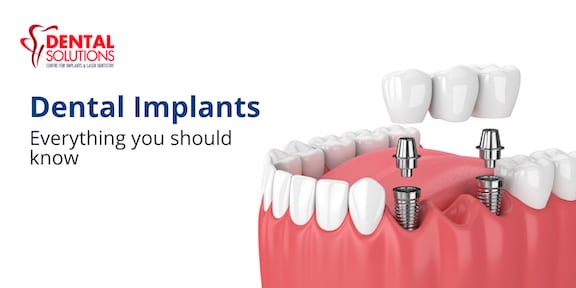
Despite improvements in dental care, millions of people suffer tooth loss. This is mostly due to tooth decay, injury, poor oral health or periodontal disease. In the past, the only treatment options available for people with missing teeth were bridges and dentures. But as dental technology advances, we see that dental implants have made a remarkable impression as the best option for missing teeth.
The article will give you complete information about –
- What are dental implants?
- Why are dental implants needed?
- What are the advantages of using dental implants?
- What is the procedure for dental implants?
- What are the potential risks associated with dental implants?
- What are the types of dental implants?
- What follow-up care is necessary after getting a dental implant?
- Frequently asked questions about Dental Implants
What are dental implants?
A screw-like structure that replaces a missing tooth is what a dental implant can be defined as. This screw-like structure is implanted into the jawbone, and it acts as an anchor for the artificial tooth which is the crown. A device called an abutment connects the artificial tooth to the dental implant.
The crown is custom-made to match the color of their teeth and fit the mouth well. Crowns look, feel, and function simply like natural teeth.
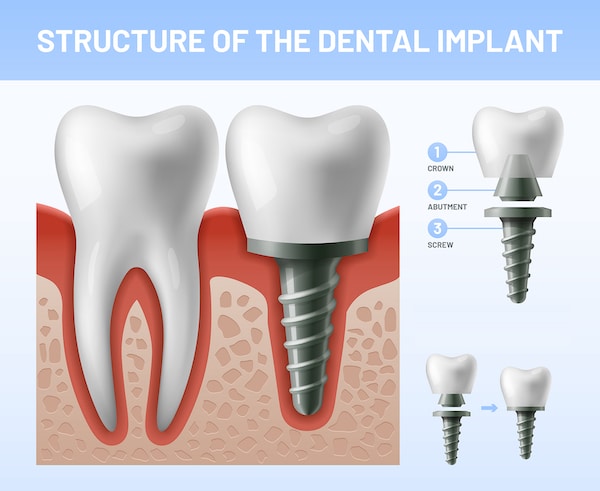
If you have been advised to undergo a dental implant procedure, you sure want to know what the procedure involves, but before that you would need to know why exactly you need the implant and what are the advantages of using dental implants.
Why would you need a dental implant?
As stated at the onset, dental implants have made fixing missing teeth easier. Dental implants can be used to replace a single tooth, several teeth, or all of the teeth. The goal of teeth replacement in dentistry is to restore function as well as esthetics.
Tooth replacement generally has are three options:
- Denture or Partial Denture – removable dental appliance
- Cemented fixed dental bridge
- Dental Implant.
While you will hear a lot of people prefer dentures, they might not be the best option for all. No doubt, they are a more affordable option for replacement teeth but are the least desirable because of the inconvenience of a removable appliance in the mouth. Further, dentures can affect one's taste and sensory experience.
Before dental implants came into picture, dental bridgework was the more common restorative option. Bridgework is dependent on existing natural teeth for support which is a major disadvantage.
Deciding on which option to choose for replacement of missing teeth depends on many factors.
For dental implants, these factors include:
- Jawbone quantity and quality (where the dental implant will be placed)
- The location of missing tooth or teeth,
- Overval health of the patient
- Cost of dental implant
These factors will be examined by the dental surgeon – a clinical assessment of whether the patient is a good candidate for a dental implant. The cost and the preference of dental implant will be discussed with the patient before going ahead with the procedure.
The question boils down to, if Dental implants are really the best option for tooth replacement , what are some of the advantages of using dental implants. Well ,there are great advantages to choosing a dental implant for tooth replacement over the other options. They are conservative, which means missing teeth can be replaced without affecting or altering the adjacent teeth. Additionally, since dental implants integrate into the bone structure, they are very stable and function like one's own natural teeth.
What Are the Advantages of Dental Implants?
There are many advantages to dental implants, including:
- Speech improvement – Poor-fitting dentures can cause you to mumble or slur your words, this happens as the denture can slip inside the mouth. Dental implants, you do not have to worry there is no chance of them slipping out of its place.
- Comfortable – Unlink dentures, dental implants are a part of the mouth and hence implants eliminate the discomfort of removable dentures.
- Improved Eating – Sliding dentures can make chewing difficult. Dental implants function like your own teeth, allowing you to eat with confidence and without pain.
- Improved self-esteem – Dental implants give you back your natural smile and help you feel better about yourself.
- Improved appearance – Since dental implants look and feel like your own teeth. And because they are designed to fuse with bone, they become permanent.
- Durability – With good care, dental implants are known to last for many years or a lifetime.
Now that you know the advantages, let's understand the dental implants procedure.
Procedure for Dental implants – How are dental implants fixed?
First, a treatment plan will be developed. The plan will address your needs and is prepared by a team of professionals – these professionals are specially trained and experienced in oral surgery and restorative dentistry. This team approach provides coordinated care based on the implant option that is best for you. During the consult and planning stage, the dental surgeon will visually examine the site in the mouth where a dental implant is being considered as well as look at dental imaging studies (X-rays, panoramic films, and/or CT scans). At this time, the quality and quantity of the jawbone is assessed to determine if more bone is needed at the site.
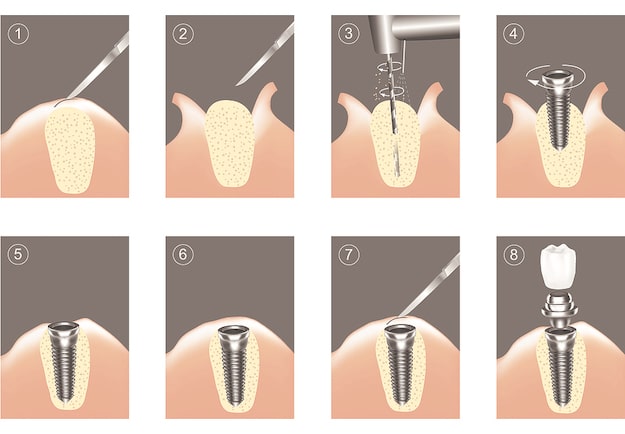
Next, the tooth root implant, which is a small post made of titanium, is placed into the bone socket of the missing tooth. As the jawbone heals, it grows around the implanted metal post, anchoring it securely in the jaw. The healing process can take from six to 12 weeks.
Once the implant has bonded to the jawbone, a small connector post — called an abutment — is attached to the post to securely hold the new tooth. To make the new tooth or teeth, your dentist makes impressions of your teeth, and creates a model of your bite (which captures all of your teeth, their type, and arrangement). The new tooth or teeth is based on this model. A replacement tooth, called a crown, is then attached to the abutment.
Instead of one or more individual crowns, some patients may have attachments placed on the implant that retain and support a removable denture.
Your dentist also will match the color of the new teeth to your natural teeth. Because the implant is secured within the jawbone, the replacement teeth look, feel, and function just like your own natural teeth.
Are you still wondering if there are any risks involved in getting dental implants surgery? Read further to find the answer.
What are the potential risks, complications, and problems with a dental implant?
Every surgery comes with risks and complications. The same is with dental implants.
A thorough examination is critical to the success of the surgery as it is important to ensure that a patient is healthy enough to undergo oral surgery and heal well post implant procedure.
Just like any oral surgery procedure, infections, bleeding disorders, allergies, existing medical conditions, and medications need careful review prior to proceeding with treatment. Fortunately, the success rate is quite high and failures usually occur in the unlikely event of infection, fracture of the dental implant, overloading of the dental implant, damage to nerves, blood vessels, teeth or poor positioning of the dental implant, sometimes, poor bone quantity or quality.
In some cases, a second attempt can be made to replace a failed dental implant after the requisite time for healing has taken place.
Dental implant surgery is usually not recommended for people who might fall into any of these categories –
- acute illness
- uncontrollable metabolic disease
- bone or soft tissue disease or infection
If people with any of the above undergo dental implant surgery, there is a higher risk of the implant failing.
Dental surgeons may also choose not to operate on people undergoing the following treatments, due to an increased risk of implant complications:
- bisphosphonate drug treatment for bone loss diseases
- chemotherapy
- radiation therapy of the head or neck
However, the surgeons will discuss other alternatives that might best suit the condition.
Potential complications of implant surgery
Very few people experience complications during or after dental implants surgery. Complications like:
- movement of the implant
- nerve damage, resulting in altered sensation in the surgical area
- infection of the implant, which might occur due to poor care
- an opening of the incision following surgery
- exposure of the implant above the gumline
Watch for the following signs and symptoms
- the implant is mobile
- pus formation
- pain when tapping the implant
- Bone loss
- bleeding
What are the various types of Dental Implants in India?
- Endosteal implants
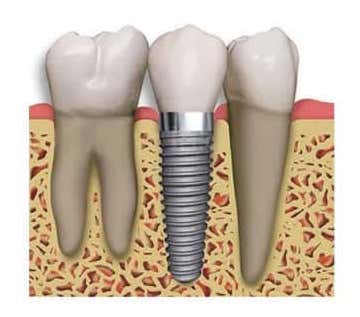
These are the most common types of dental implants. They are mostly made of titanium, shaped like screws, and are surgically implanted in the jaw bone. This almost takes 3 sittings. Once the surrounding gum tissue has healed, a second surgery is needed to connect the post (abutment) on the implant. Finally, an artificial tooth (or crown) is an artificial tooth (or teeth) placed on the extension of the post.
These implants are generally prescribed or advised for most of the patients needing a dental implant. To go ahead with this implant, all you require is a good, healthy jawbone.
Didn't like the idea of something being placed into your jawbone? Well, then, you might like the idea of the second most common implant.
- Subperiosteal implants

This one is the main alternative to endosteal implants, but not as common as endosteal implants. These implants consist of a metal frame. The metal frame is fitted onto the jawbone (rests on top of the bone), just below the gum tissue. In time, as the healing process starts, the frame gets fixed to the jawbone. The posts that are attached to the metal frame, protrude through the gums As the gums heal, the frame gets fixed to the jawbone. The last step is just as with endosteal implants, the artificial tooth (or crown) is then mounted onto the post.
Dental experts advise this type of implant to patients that have a weak jawbone or do not have enough jawbone space for an implant. Also, a patient can choose between the two of the former seems too much of intensive oral surgery.
- Zygomatic Implants
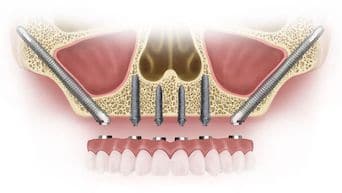
These are the least common type of implants and involve a complicated procedure. It is advised in very rare cases and should only be done if you don't have enough jawbone for the Endosteal implant. The implant is placed in the patient's cheekbone rather than the jawbone.
Although there are differences in the implants and their procedures, dental implants are the safest options to replace missing teeth, are long-lasting and the safest option. The type of dental implant brand your dentist uses has to be of the highest quality and must suit your specific condition.
What follow-up care is necessary after getting a dental implant?
Aftercare is very important once dental implant surgery is done.
Dental implants have the risk of developing a condition called “peri-implantitis,” which is the equivalent of gum disease. The inflammation happens due to the surrounding tissues which is often due to excessive biting forces on the implant or bacterial infection.
If left untreated, peri-implantitis can result in the loss of an implant.
After getting a dental implant, routine maintenance and follow-up at the dental clinic are essential. Good oral hygiene for a dental implant at home involves routine brushing and flossing to keep plaque away.
Cost of Dental Implants in India
In India, the cost of dental implants ranges from around 35000-50000 INR. There are other high-quality implants that could cost you more. The cost also depends on the type of implants.
Here are some of the factors affecting dental implant –
Some of the factors that can directly impact the cost of your dental implants in India –
- Type of Implant: As seen above there are various types of implants. And the quality of each is different and the price is different. Depending on the type of implant your dentist advises and the quality you decide to choose, the cost of implant treatment will vary.
- The procedure or treatment: Based on the complexity of the case – Thus the cost for the complete dental implant treatment also varies.
- Bone Grafting: Some dental implant patients require additional procedures like Sinus Lift or Bone grafting before a dental implant procedure can be commenced. For example, if there is not enough bone to place the implant, your dentist might want to do a bone grafting first. Cost for bone grafting is added up to the cost of the treatment.
- The Dentist or the Dental Surgeon: If you are working with a highly skilled dental implant specialist, the fee might be slightly higher. Dental implants treatment requires highly specialized skills and it is definitely advisable to work with a dental implant specialist.
Frequently asked questions about Dental Implants –
Does having a dental implant hurt?
Although screwing and drilling may sound extremely painful, you'll be comforted to know that placing an implant is easier than taking a tooth out. The surgery is conducted while the patient is sedated – usually a local anesthetic is used, which means you are awake during the surgery. Also, there are not many pain-sensing nerves around the bone where the implant is placed. But if you are very nervous about the whole surgery, general anesthesia is available under the guidance of the doctor.
This does not mean there will be no pain at all. After the surgery you will experience some discomfort and pain. This can be managed by the painkillers or any medicines your doctor prescribes you. It is highly recommended to use an ice pack after the surgery as this will reduce the swelling.
Rinsing gently with warm saltwater throughout the days following the procedure will help soothe the tissues and will offer additional relief.
This does not mean there will be no pain at all. After the surgery you will experience some discomfort and pain. This can be managed by the painkillers or any medicines your doctor prescribes you. It is highly recommended to use an ice pack after the surgery as this will reduce the swelling.
Rinsing gently with warm saltwater throughout the days following the procedure will help soothe the tissues and will offer additional relief.
How Successful Are Dental Implants?
Success rates of dental implants vary, depending on where the implants are placed. In general, dental implants have a success rate of up to 98%. With proper care implants can last a lifetime.
How long do dental implants last?
In the recent past, the demand for dental implants has been increasing due to its long lasting benefits and other advantages stated above – Dental implants can last a lifetime and are a one-time procedure.
Can dental implants get infected?
Just like natural teeth, dental implants can get infected by poor oral care. When the gums and bone structure around the implant gets infected, it forms a disease called peri-implantitis. It's caused due to bacteria present in the mouth. If left untreated, it causes inflammation, bone loss, and implant failure. Additionally, low-quality dental implants can put you at a higher risk of developing an oral infection.
Are dental implants covered under insurance?
Since this procedure is a cosmetic procedure, it might not be covered under insurance, However, it;s best to speak to your insurance agent and clarify if this is covered under the scheme you are availing.
If you are still having doubts regarding dental implants or any related concerns, reach out to the best dental clinic in Bangalore – Dental Solutions!
If you are still having doubts regarding dental implants or any related concerns, reach out to the best dental clinic in Bangalore – Dental Solutions!
